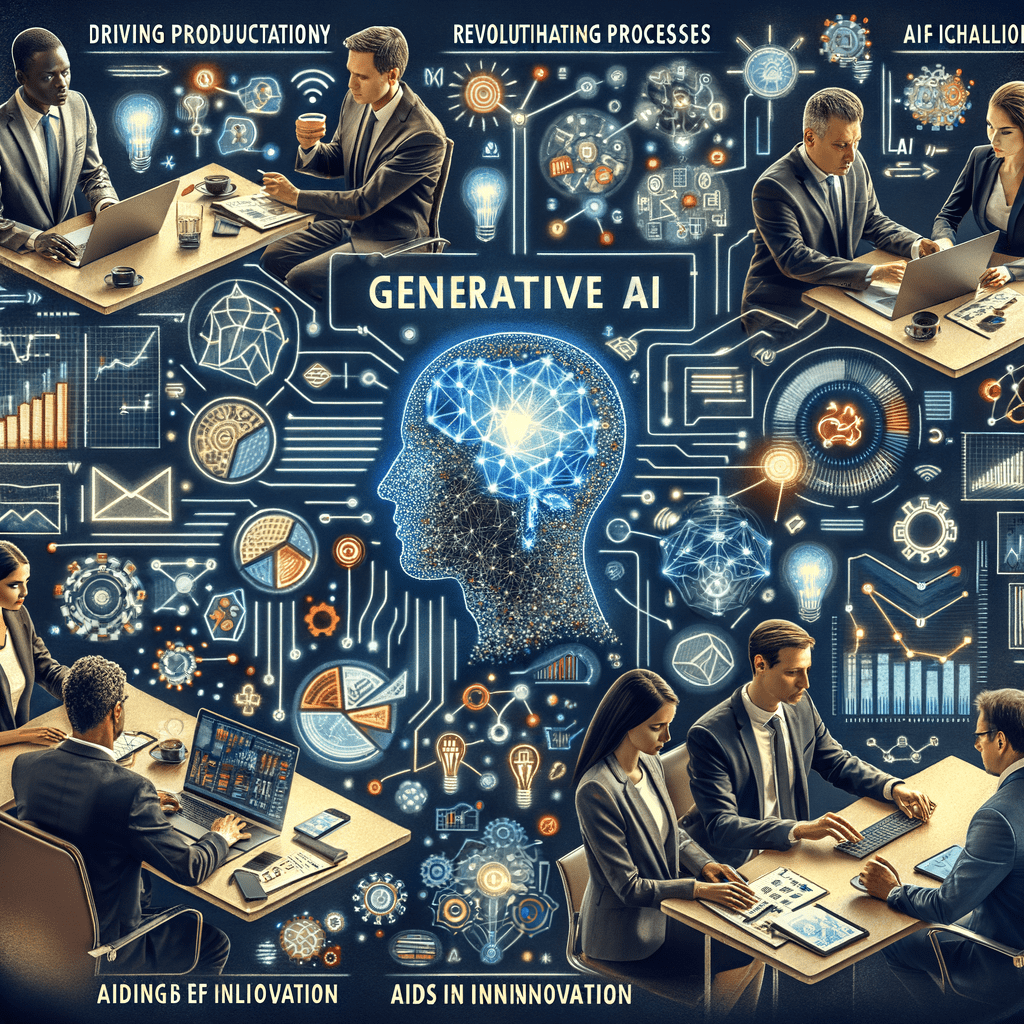For business leaders, the conversation surrounding generative AI for business is growing. This AI offers practical applications that reshape business operations. It simplifies tasks and helps teams work smarter with generative AI.
Generative AI for Business: Reshaping the Landscape
Generative AI’s rise is often compared to the advent of Netscape or the iPhone. These moments were revolutionary. Generative AI is transforming business through practical tools. These artificial intelligence tools boost efficiency and productivity.
A recent IBM survey indicates business adoption of generative AI has reached 35% since 2022. This growth demonstrates the increasing recognition of generative AI’s potential to revolutionize various business functions.
What is Generative AI?
Generative AI creates different content formats, including text, images, music, and code. Examples include ChatGPT for text generation, DALL-E 2 for image creation, and platforms like Synthesia and Copy.ai for marketing. Instead of simply analyzing existing data, generative AI learns patterns from data to produce something new. It goes beyond data analytics, utilizing machine learning and natural language processing to create original content.
How Can Businesses Use It?
This AI excels at automating daily tasks. McKinsey notes generative AI can automate up to 70% of employee tasks, such as writing emails, creating reports, and coding. This automation frees your team for strategic, creative work, enabling them to focus on higher-value activities. McKinsey’s research reveals generative AI’s significant economic potential. By leveraging this AI technology, businesses can optimize resource allocation and enhance overall operational efficiency.
Generative AI offers more than task automation. It improves productivity, saves costs, personalizes customer interactions, accelerates R&D, and enhances customer support. Generative AI has shown potential in improving business decision-making.
In marketing, roughly 70% of companies use generative AI for tasks ranging from personalized emails to market segmentation, according to a BCG survey. The use of natural language processing and other generative AI capabilities can positively impact many marketing campaigns.
Bolt, a European company, uses generative AI to lower costs and handle most customer support tickets. This real-world example demonstrates the practical benefits of applying generative AI tools to streamline operations and enhance customer service. Such AI applications free up human agents to address more complex issues.
From analyzing data to understanding customer preferences via large language models, generative AI can fuel growth. One application lies in scientific fields where AI algorithms have created self-assembling nanostructures. In healthcare, companies like Nvidia bolster their Clara platform with BioNeMo generative AI for drug discovery. Generative AI development can create a generative AI platform tailored to specific business needs and integrated within current business models.
Customer service also benefits immensely. The integration of generative AI with conversational AI improves customer relationships, offering cost reductions of up to 30%. Studies suggest generative AI contributes 25% of all digitally produced content. Generative AI applications offer exciting possibilities across diverse fields.
| Industry | Use Cases | Potential Benefits |
|---|---|---|
| Finance | Fraud detection, risk assessment, market analysis | Reduced losses, improved accuracy |
| Customer Service | AI chatbots, personalized recommendations | Improved satisfaction, 24/7 availability |
| Software Development | Automated code generation | Faster time-to-market |
| Marketing | Content creation, personalized ads | Increased engagement, improved ROI |
| Healthcare | Drug discovery, diagnosis support | Faster research, better patient outcomes |
| Manufacturing | Predictive maintenance | Improved production and cost-saving |
Nvidia uses its generative AI to control humanoid robots. This shows generative AI’s potential beyond software. In finance, AI streamlines market insight gathering, fraud detection, and reporting. Businesses are also using these tools to develop budget predictions and manage other business processes, enabling them to streamline their workflows and decision-making.
A key benefit of generative AI is personalizing customer interactions. By learning customer habits through enterprise data, generative AI tailors services to those behaviors. This fills a crucial need for companies struggling with personalized recommendations. It can potentially lead to more effective solutions to existing business problems. Generative AI models also help businesses leverage broader datasets for various tasks such as text generation, predictive analytics, and other data-driven analyses.
Tailored offers not only improve conversions but also strengthen human/AI collaboration. Personalized services foster better brand connections and B2C relationships. Generative AI systems can improve marketing efficiency.
FAQs about generative ai for business
How can generative AI be used in businesses?
Generative AI automates tasks such as writing emails, generating code, or creating reports. This allows employees to focus on strategic work and enhances productivity within business processes. Automating tasks frees human talent to address more critical and specialized functions that need greater focus.
What is the most popular generative AI tool?
ChatGPT, developed by OpenAI, gained widespread recognition with 100 million users in two months. This widespread adoption highlights the growing interest in AI tools and their potential applications across diverse domains.
How could generative AI change your business?
Generative AI enhances efficiency by automating tasks and improves personalization with tools like chatbots. The ability of AI models to tailor recommendations based on large data sets enhances personalization by offering products specific to each customer and market segments they belong to. Generative AI poses some challenges with responsible AI development. For example, generative AI creates bias detection as it learns and becomes a concern for some. The evolution of data bias detection becomes part of any strategy for data privacy, accuracy, and overall governance.
What is an example of generative AI in the workplace?
Consider AI generating first drafts of marketing copy, freeing your team for creative refinement and reducing reliance on text generation tasks.
Harnessing Generative AI's Transformative Potential
Generative AI is transforming the business landscape. Adapting to significant industry shifts is crucial for scaling up. Generative AI’s impact on various functions reveals the industry’s trajectory. Ignoring it is a missed opportunity. While challenges exist, such as data privacy and bias, the potential is too significant to ignore, especially with the rise of language processing and the demand for improved customer search experience.
Generative AI’s clear advantage lies in automating daily work. This is likely the first phase of improvements, with more advantages to come. Businesses using generative AI are preparing to create new business models, personalize product recommendations, and target specific segments with solutions to help improve decision-making processes.




